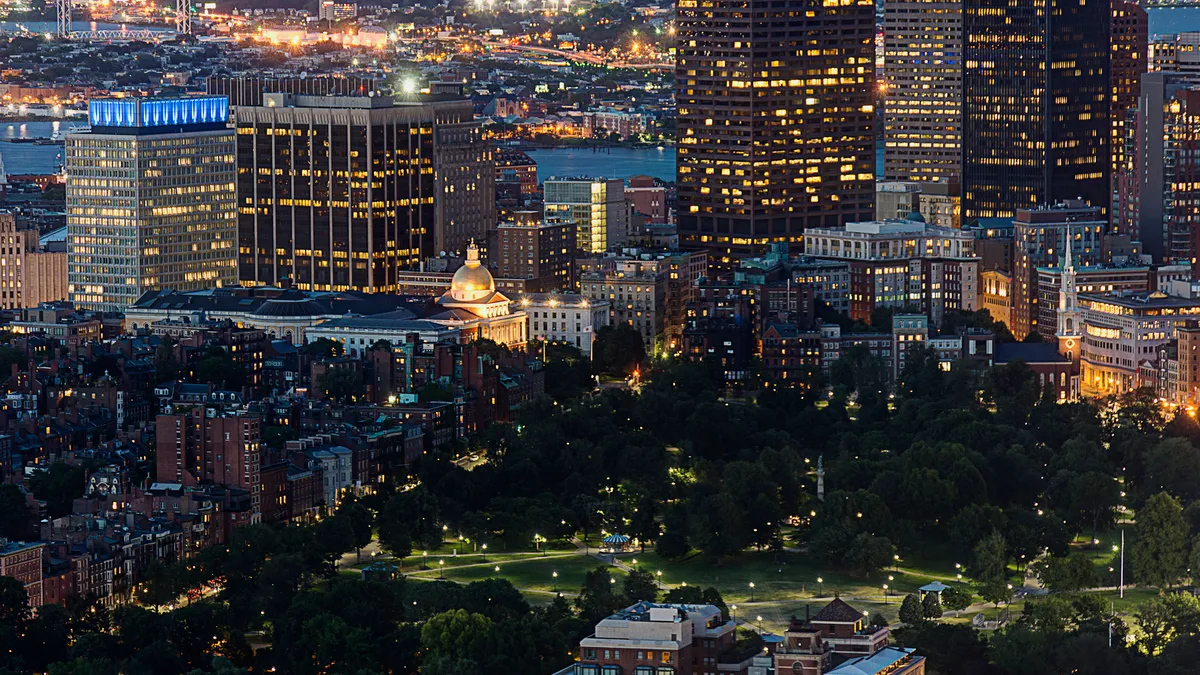Dive Brief:
- Boston Mayor Marty Walsh proposed several initiatives to improve the city's transportation infrastructure, designed to boost safety, ease traffic congestion and provide more viable transportation options.
- Improvements include lowering the speed limit to 20 mph on city streets, a pilot for designated ride-hailing pick-up and drop-off points, a pilot of new bus lanes, and free transit bus passes for all students in grades 7-12.
- Walsh also is petitioning the state of Massachusetts for help with initiatives included in a series of transportation bills he's championing. The two most notable measures in the legislation are to use photo enforcement for certain traffic violations and to charge a rush-hour service fee on ride-hailing services that would go toward improving road, transit, bicycle and pedestrian infrastructure.
Investing in the @MBTA is not a choice—it’s a necessity. We'll need to transition both our buildings and our vehicles to electric energy from renewable sources. We’ll need to send less waste to incinerators. #LookToBoston #BMRB19
— Mayor Marty Walsh (@marty_walsh) March 7, 2019
Dive Insight:
The new initiatives relate to projects laid out in the Go Boston 2030 transportation plan and the city's Vision Zero plan. Boston updated its Vision Zero plan in the fall and highlighted progress already made toward reducing traffic deaths. For example, it detailed the initiative to lower the speed limit from 30 to 25 a few years ago. Walsh's new plan is to further reduce the speed limit from 25 to 20.
The designated ride-hailing pilot entails converting some curb space to a ride-hailing pick-up and drop-off zone from 5 p.m. to 8 a.m. every day. The idea is to ease congestion caused by ride-hailing drivers double-parking in travel lanes, as well as to increase the safety of passengers entering or exiting a vehicle. The city will install signs directing drivers and passengers to the designated ride-hailing zones and will analyze the program's effectiveness. Uber and Lyft have agreed to support the pilot. Other cities including Ft. Lauderdale, FL and Washington, DC have tried ride-hailing zone pilot programs to better manage curb space, increase safety and decrease congestion.
The bus pass program will bump up the number of students receiving free passes from 20,000 to 30,000. It reportedly will expand students' school options across the city. The Seattle City Council approved a similar plan last summer that grants free bus passes to all public high school students. Boston's free pass program will be more extensive, though, because it includes both middle- and high-school students as well as students in private or parochial schools. In addition to helping out students, the city hopes to build a younger generation of transit users, reports WBEZ.
Walsh outlined the plans for the city's transportation future during his annual address to the Boston Municipal Research Bureau. Key points of the address were also posted in a series of tweets on Walsh's Twitter account. They include accomplishments the city has already made such as installing dedicated bus lanes, adding early-morning bus service, installing protected bike lanes, re-timing dozens of traffic lights and launching a "transit team" to work with the transit agency to improve service.
Walsh brought up other ideas for the future, including adaptive traffic signals that respond to real-time conditions and future investments in the transit system which he said is "not a choice" but a necessity. He also noted the need to transition transit vehicles to electric power.












